Against Remaking Classic Metal Gear
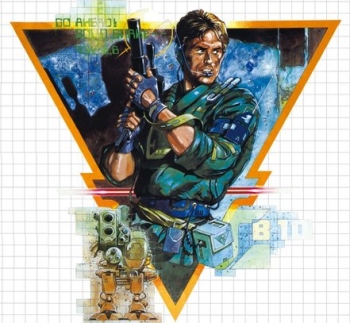
Editorial by Ravi Singh, Posted on September 4, 2014
There has been a voice calling for a remake of the classic Metal Gear games as far as I remember. It started quietly, with an ignorant fanbase equipped only with an internet not nearly as accessible as today’s wanting the NES Metal Gear (itself a remake) remade. The series grew in popularity and the classic MSX games became more known amongst an audience that is used to the series being referred to as “the Metal Gear Solid franchise” by so-called journalists. The voice continues to grow louder with each new installment to the series.
I never have been a part of this voice. I loath the idea of remakes. Actually that is not completely true. I have, for example, proposed a remake in HD using hand-drawn artworks instead of 8-bit sprites similar to the HD remake of Street Fighter 2. This is not the type of remake I am discussing here though, nor is it the type of remake people demand. I am instead talking about taking the classic titles and essentially making brand new three-dimensional games out of them for a new generation of gaming.
1987 was a long time ago. Sure, some of us fans are younger than the series itself but consider this—unless you are just getting into the series, how have you changed since the first time you played a Metal Gear game? The series, too, has changed along with the times due to improvements and/or changes in technology, conventional narrative, existing fictional universe, and even Hideo Kojima himself. Metal Gear was Kojima’s first project as game designer and at the time he was struggling in Konami and seriously considering quitting the games industry. The man is now Vice President of Konami Digital Entertainment.

Further dividing the classic games with the rest of the series is the gap between Metal Gear 2: Solid Snake and Metal Gear Solid. It is an eight-year period without any installments to the Metal Gear series. Likewise while I do recommend fans to at least play Metal Gear 2: Solid Snake, I completely recognize the fact that it is, along with its predecessor which ignited the entire series, not a requirement for fans to understand the series; their summaries in Metal Gear Solid‘s PREVIOUS OPERATIONS menu suffice.
“But,” the remake advocate will say, “It would be nice to have fans be able to play through Solid Snake’s triumph over his former commander in a depiction that fits in with the ‘Solid series. Especially now with the possibilities the FOX Engine presents. Right?” Perhaps it would be, but I assure the advocate that whatever it is they are imagining in their heads is completely different from what the actual product would be.
I first want to point out an observation here. From what I have noticed, it seems like those of us who really enjoy the classic titles do not want them remade whereas those who either dislike them or never even bothered to play through them cheer on the idea of a remake. I am sure there are exceptions, but my anecdote kind of makes sense because the type of remake that fans are asking for will essentially create brand new games to replace the old ones. There is no other way to do it. We have gone through so much since 1990.
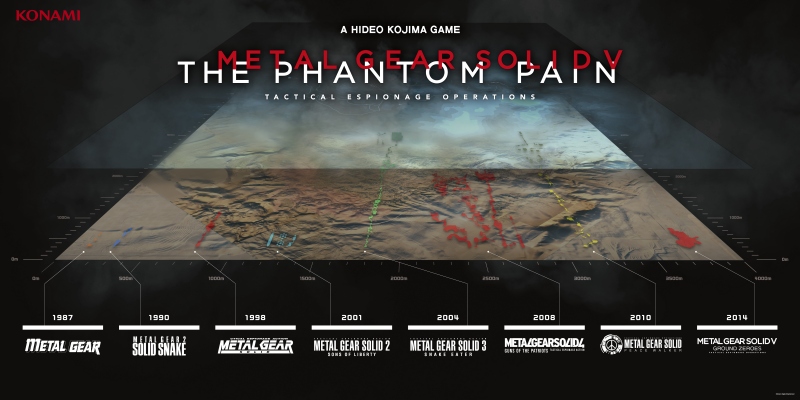
Days before E3 2014 Hideo Kojima showed off a map of the play area for Afghanistan in Metal Gear Solid V: The Phantom Pain and overlapped the play areas for each of the canon Metal Gear titles he has directed on top to demonstrate the sheer massiveness of The Phantom Pain. Look at the maps for the classic titles. Look at how small they are compared to everything since. Even if we combine Outer Heaven and Zanzibar Land, we find ourselves with a map that is at best comparable to Shadow Moses. Metal Gear Solid V: Ground Zeroes was derided as a “demo” yet even its map is still larger than the maps of the classics.
It seems weird because these games seem much larger yet everything is in scale on the maps. The thing to take into consideration is that the classic games featured its map within individual screens with a limited set of actions available to the player to make. If Camp Omega from Ground Zeroes was somehow ported into Metal Gear 2: Solid Snake, the discrepancy in size would make sense.
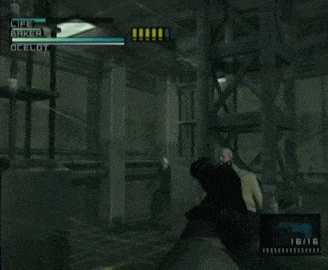 If you thought Sons of Liberty‘s first person aiming made the Revolver Ocelot battle too easy, imagine how it would be with Metal Gear Solid V‘s Reflex Mode!
If you thought Sons of Liberty‘s first person aiming made the Revolver Ocelot battle too easy, imagine how it would be with Metal Gear Solid V‘s Reflex Mode!When Silicon Knights remade Metal Gear Solid as The Twin Snakes, they took the same map as the original, made minor adjustments like throwing a few lockers in there and simply ported it within the Metal Gear Solid 2: Sons of Liberty game engine. Sons of Liberty‘s enemy AI relies on the new places to hide that were present in the game they were designed for. Sons of Liberty‘s first-person aiming seems cheap within areas that were designed without this gameplay mechanic in mind. As a result, The Twin Snakes felt claustrophobic during alerts as players frantically looked for anywhere to hide through an evasion. Yet sneaking felt effortless thanks to simple enemy patrol routes not designed for the tranquilizer gun that had no consequences for the player.
Sons of Liberty was developed within a mere three years after Metal Gear Solid, jumping only one generation of gaming hardware. Metal Gear and Metal Gear 2: Solid Snake are around fifteen years old, and with the PlayStation 4 and Xbox One we have seen five generations of gaming platforms since the MSX2 standard was developed. There is absolutely no way they can just take the titles and make them work well with modern gameplay. They sure as fuck cannot do that with the story presentation either.
Despite being the more story-driven of the classics, Metal Gear 2: Solid Snake‘s script only contains around 6,700 words. The script for just the cassette tapes in Ground Zeroes is shorter by a mere thousand words. Regardless, the script for every Metal Gear game since Metal Gear Solid blow that number out of the water. Even when combining the classics, the end result is that the narrative in the games will have to be dramatically expanded.
This may actually seem as a good thing at first, but consider what needs to be expanded in general. The idea of Snake running around Outer Heaven and finding cassette tapes that reveal more about what happened with Big Boss between 1984 and 1995 may sound exciting, but I am not even talking about supplementary narrative in the form of cassette tapes, radio calls, or the like. I’m talking about the main narrative; is there any room for expansion here? Outside of a briefing and some smoothed-out lines, it does not seem like anything that would not be heavily manufactured could fit. Existing characters will have unnecessary details made-up for them just for the sake of “modern storytelling” and perhaps even new characters may be thrown in to help fatten the story up.
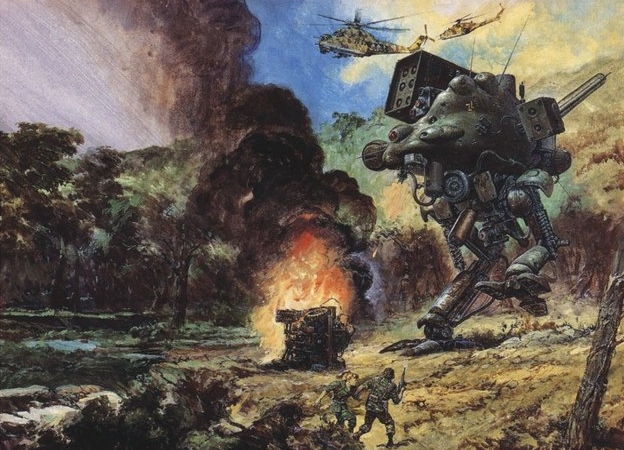
Basically, what we would get is mostly filler. This is not character development because pretty much all of the characters have no need to be developed further than they already are. There are claims of fixing from proponents of the remakes, but when it comes down to it, a proper remake would inevitably lead to retcons as the series has become large and complex already, and modernizing games that were released in 1987 and 1990 would force their scripts to become larger and complex as well, making room for errors.
Outside of Metal Gear 2: Solid Snake‘s claim of a world without nuclear weapons as well as the few references to the Soviet Union in a game that takes place in 1999, the only “retcons” are technological such as the Metal Gear units themselves. Which, if that is what remakes are made to fix, you better start looking at REX in comparison to the technology in Metal Gear Solid: Peace Walker. Should we then proceed to remake every Metal Gear title so that the iDroid’s existence in 1975 makes any fucking sense at all? As for the “big” one regarding Snake finding out Big Boss is his father in Zanzibar Land, that is actually a myth.

What value would remaking the classics add to the series? We already know what happens. So what, exactly, are remakes going to bring to the table that we do not already have? I am all for ending the canon or at least having a freer one but if the choice was between a prequel starring The Boss or remaking the classics, I would pick the prequel. I know The Boss did stuff in World War II. I know she gave birth to Ocelot. I know she kills her baby-daddy later. That is about it. Make a game out of that and there will be a lot of actual, new material. New installments at least add something to the series.
Hideo Kojima himself seems to want to work on new material rather than remake the old. Sure, there was The Twin Snakes, but that was outsourced to Nintendo who in turn had Silicon Knights develop it. When asked what Metal Gear title he would like to remake using the Fox Engine, he said Metal Gear Solid—right after mentioning that he was “not too fond of remakes.” In short, not even Kojima is interested in remaking the classic titles and would rather use his time and energy on new projects.
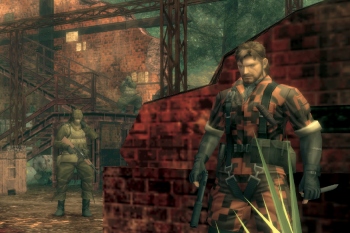 Remember when these graphics were amazing? Do we need to remake this so that they still are or can we appreciate it for what it was and move the fuck on?
Remember when these graphics were amazing? Do we need to remake this so that they still are or can we appreciate it for what it was and move the fuck on?Everything ages. I know Metal Gear Solid V with its Fox Engine is hot shit right now, but there will be a time where we will look back in a sort of amused way as we do with the PlayStation and PlayStation 2 installments that have wowed us before. Every main installment in the series stood out for their time; even Peace Walker does when you consider the platform it was developed for. Do we really need to just keep on remaking them to fit with a modern style of gaming and narrative that they were not developed for in mind?
Making older games more accessible to newer generations should be encouraged. Even minor touch ups to make the game more enjoyable on newer devices and coherent with the current canon are welcome additions. To completely turn them into new experiences though not only takes away resources that could be used on a new title but disregards the classic with a replacement even though said replacement will itself eventually become outdated anyways. You do not need to rewrite history in order to enjoy it.